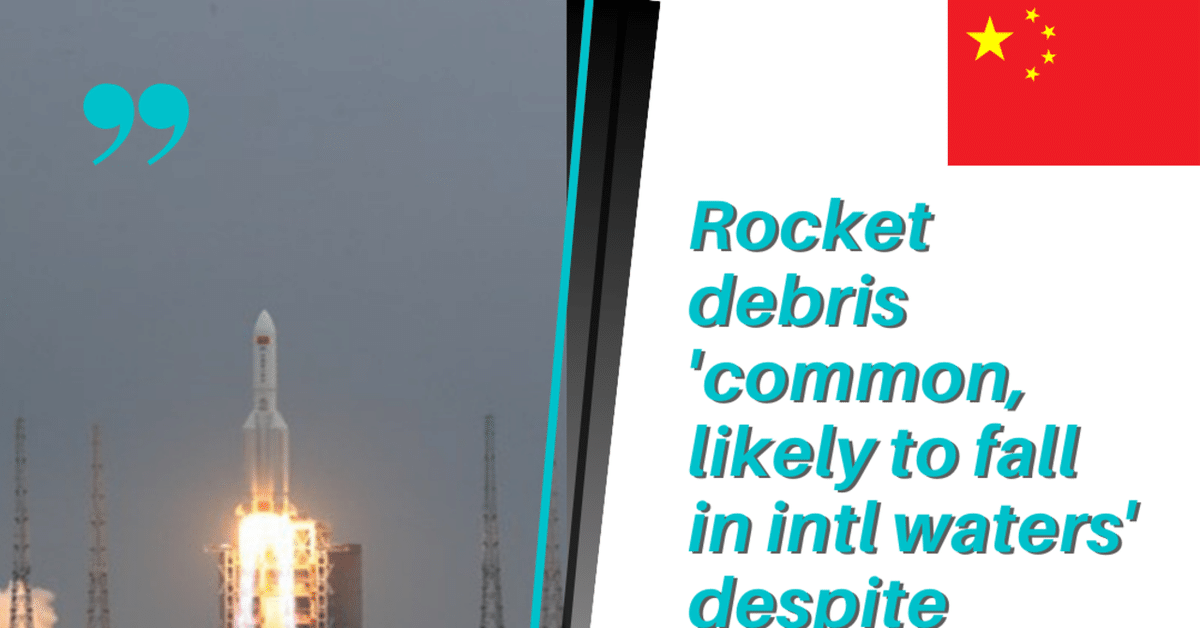
China rocket's debris
People’s daily
http://en.people.cn/n3/2021/0506/c90000-9846721.html
Rocket debris 'common, likely to fall in intl waters' despite Western hyping of 'China space threat'
ロケットの残骸「通常、公海に落下する可能性が高い」が、欧米は「中国の宇宙脅威」と主張
Debris from China's Long March-5B Y2 carrier rocket, which sent the first section of China's space station into orbit, is very likely to fall in international waters and people needn't worry, Chinese space analysts told the Global Times on Wednesday.
宇宙に打ち上げた中国の宇宙ステーションの一部、March-5B Y2の残骸は公海に落下する可能性が高い、と中国の宇宙アナリストたちは水曜日にGlobal Timesに述べた。
Wreckage from rocket launches falling back to Earth is common in the aerospace field, and the Pentagon's reported claim that the rocket wreckage will fly back "out of control" and "may cause damage if it hits inhabited areas" is nothing but Western hype of the "China threat" in space technology advancement, observers noted.
ロケットの残骸が地球に落下することは、航空宇宙分野ではよくあることであり、ペンタゴン(米国国防総省)が報じた「制御不可能」や「居住地域に落下した場合、損害が出る」などという主張は、中国の宇宙技術の進歩における「中国の脅威」という欧米の誇大広告に他ならないと指摘されている。
Despite "worries" from the US Defense Department, industry insiders believe the situation is not worth panicking about. Jonathan McDowell, an astrophysicist at the Astrophysics Center at Harvard University, was quoted by CNN as saying the risk of being hit by the falling debris is "incredibly tiny."
米国国防総省からの「懸念」にもかかわらず航空宇宙関係者はこの事態は心配するほどのものではない、と述べた。ハーバード大学の天体物理学者ジョナサン・マクダウェルはCNNの報道で落下する残骸に直接当たる確率は「極めて低い」とコメントした。
Wang Ya'nan, chief editor of Aerospace Knowledge magazine, added that the development of rocket debris falling was carefully considered by China's space authorities from the initial rocket design phase and the choice of a launch site, to the rocket's liftoff attitude and its trajectory.
航空宇宙知識マガジンの編集者であるWang Ya'nanは、ロケットの残骸が落下してくる事は中国の宇宙当局によって、初期のロケット設計段階や発射場所の選択、ロケットの発射姿勢や軌道に至るまで、慎重に検討されたと述べた。
"Most of the debris will burn up during re-entry into the Earth's atmosphere, leaving only a very small portion that may fall to the ground, which will potentially land on areas away from human activities or in the ocean," Wang told the Global Times on Wednesday.
「残骸のほとんどは地球の大気圏に突入したら焼滅し、地上に落下するのはごく一部で、人々が生活しているエリア、又は海に落下する確率が高い」と水曜日にWangはGlobal Times で主張した。
The New York Times
https://www.nytimes.com/2021/05/06/science/china-rocket-crash-long-march-5b.html
almost certainly
Heads Up! A Used Chinese Rocket Is Tumbling Back to Earth This Weekend.
気をつけて!週末に中国の使われたロケットが地球へ落下してくるよ。
No, you are not going to be hit by a 10-story, 23-ton piece of a rocket hurtling back to Earth.
いや、あなたはほぼ確実に地球に落ちてくる23トンで大きさ十階のロケットに当たらないよ。
That said, the chances are not zero. Part of China’s largest rocket, the Long March 5B, is tumbling out of control in orbit after launching a section of the country’s new space station last week. The rocket is expected to fall to Earth in what is called “an uncontrolled re-entry” sometime on Saturday or Sunday.
とはいえ、可能性はゼロではない、中国の宇宙ステーションを作るため打ち上げられた中国の一番大きいロケット、The Long March 5Bの一部は軌道から制御不可能に落下してきている。このロケットは土曜日又は日曜日に地球に「制御されていない突入」という方法で落下すると予想されている。
Whether it splashes harmlessly in the ocean or impacts land where people live, why China’s space program let this happen — again — remains unclear. And given China’s planned schedule of launches, more such uncontrolled rocket re-entries in the years to come are possible.
何も害がなく宇宙に落下し、居住地域に損害を与えても、中国の宇宙計画がなぜこのようなことしたのかは不明である。また、中国の予定されている打ち上げを考えると、今後もこのような制御不能なロケットの再突入が起こる可能性がある。
The country’s space program has executed a series of major achievements in spaceflight in the past six months, including returning rocks from the moon and putting a spacecraft in orbit around Mars. Yet it continues to create danger, however small, for people all over the planet by failing to control the paths of rockets it launches.
この半年間、月面からの岩石変換や火星の周りを軌道するなど、さまざまな進展が起こった。しかしその一方で、打ち上げたロケットの軌道を制御できなかったりし、地球上の人々に危険をもたらし続けている。
この記事が気に入ったらサポートをしてみませんか?
